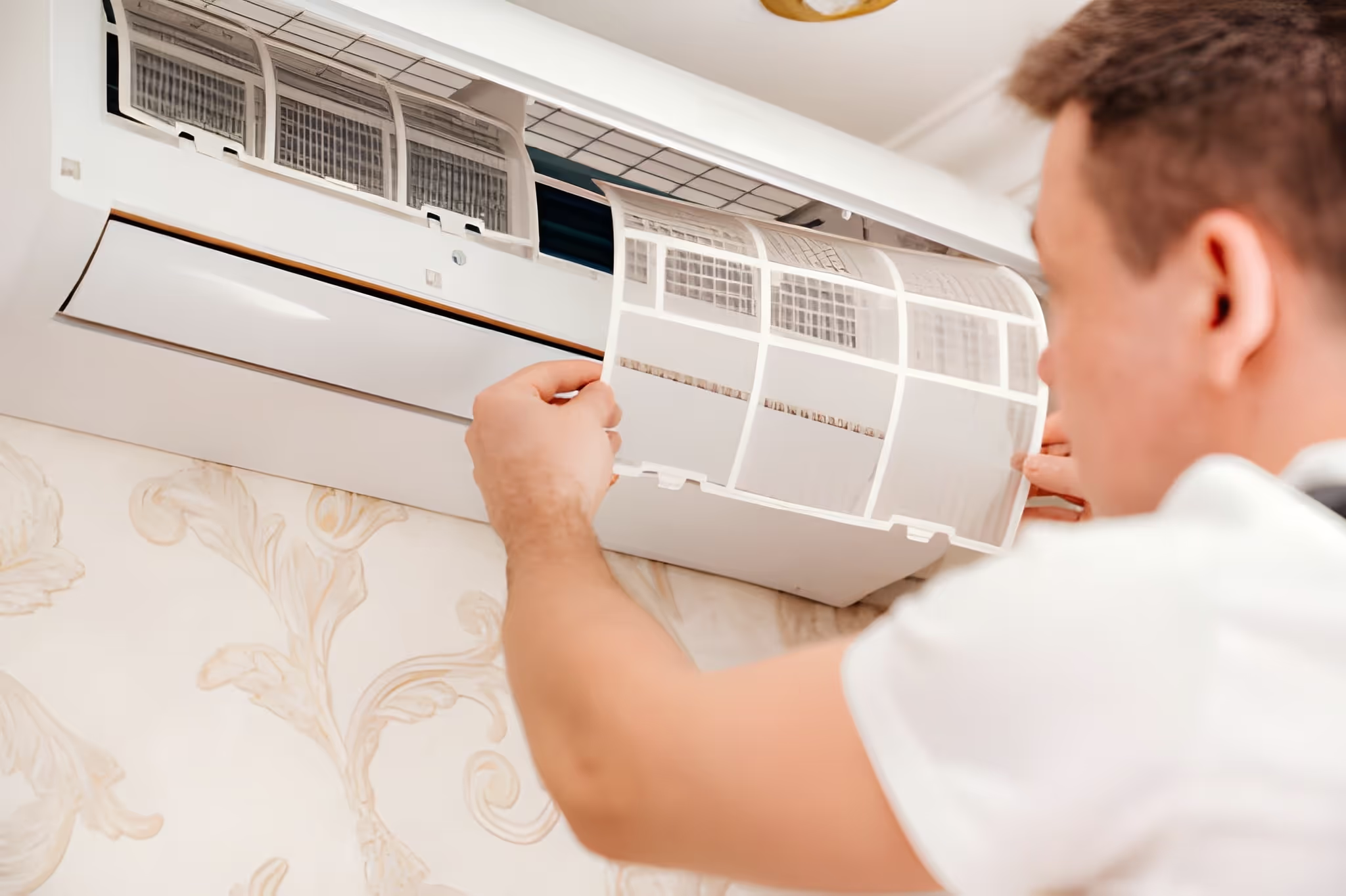Mini Split Tune-Up in Denton, TX
Keeping ductless Mini Split systems running at peak efficiency is critical for comfort and energy savings in Denton, TX. With long, hot summers, high humidity and frequent pollen and dust, Mini Splits in Denton homes work hard and pick up contaminants faster than systems in milder climates. A focused Mini Split Tune-Up identifies performance losses early, prevents emergency breakdowns, and restores cooling capacity and efficiency so your system uses less energy while delivering more consistent comfort.

Common Mini Split problems in Denton, TX homes
- Dirty filters and coils — Spring and summer pollen, lawn dust, and attic dust reduce airflow and heat transfer, causing higher energy use and uneven cooling.
- Clogged condensate drains — High humidity and biological growth (mold/mildew) cause slow or blocked drains that can trigger overflow sensors and water damage.
- Refrigerant loss or incorrect charge — Small leaks or improper charge reduce cooling capacity and can damage the compressor if left unchecked.
- Electrical wear and loose connections — Storms, power fluctuations, and age produce worn relays, loose terminals, and failing capacitors that threaten reliability.
- Thermostat or control calibration issues — Incorrect setpoint readings, sensor drift, or wireless control interference lead to short cycling, hunting, or comfort complaints.
- Reduced airflow and blocked outdoor unit — Debris around the outdoor condenser or fan issues reduce airflow and raise operating pressures.
What a professional Mini Split Tune-Up includes
A comprehensive Tune-Up is a systematic inspection, cleaning, safety check, and performance verification. The typical Tune-Up package and checklist includes:
- Filter cleaning or replacement
- Remove, inspect, deep-clean reusable filters or replace disposable filters. Explain expected lifespan and recommend replacement intervals based on local dust/pollen levels.
- Indoor evaporator coil cleaning
- Remove surface build-up to restore heat transfer. Light chemical or foaming coil cleaner is used when needed to remove grime without damaging fins.
- Outdoor condenser coil cleaning and inspection
- Clear leaves, grass, and pollen from fins and straighten bent fins to restore condenser efficiency.
- Condensate drain and pan service
- Clear and rinse drain lines, flush pan, and verify proper slope and drain safety switch operation to prevent overflows and microbial growth.
- Refrigerant pressure and charge check
- Measure operating pressures and temperatures to verify correct refrigerant charge relative to manufacturer specifications and ambient conditions. If pressures are outside normal ranges, the tech documents findings and recommends further action.
- Electrical safety inspection
- Inspect wiring, terminal tightness, contactors, capacitors, and fuses for signs of overheating, corrosion, or wear. Test voltage and current to detect abnormal draws.
- Thermostat and controller calibration
- Verify sensor readings, check wireless/smart controls, and calibrate setpoints so the system cycles properly and matches the desired indoor temperature.
- Airflow and performance testing
- Measure supply and return temperatures, static pressure where accessible, and system run-times to evaluate cooling capacity and comfort distribution.
- Vibration, mounting, and refrigerant line inspection
- Inspect line sets, insulation, wall penetrations, and outdoor unit mounting for leaks, damage, or signs of rodent activity.
- Safety checks and operational confirmation
- Test defrost cycles on heat pump units, verify safety switches, and confirm reliable start/stop behavior under load.
- Detailed service report with recommendations
- A clear, itemized report documenting current condition, prioritized repairs or corrective actions, efficiency observations, and expected benefits from each recommendation.
Diagnostic and performance testing — what it means for you
During a Tune-Up, technicians use straightforward measurements to confirm performance. Refrigerant pressure checks indicate whether the system has adequate charge and is operating within safe limits. Temperature split (difference between return air and supply air) shows how effectively the unit is removing heat. Electrical tests reveal stressed components before they fail. These diagnostics turn guesswork into actionable items so you know whether a simple cleaning will restore normal operation or a leak/part replacement is required.
Why timely Tune-Ups matter in Denton
- Maintain cooling capacity during Denton’s long cooling season so rooms reach set temperatures faster.
- Reduce energy use and utility bills by restoring proper airflow and heat transfer. Even modest coil fouling can increase run time significantly.
- Prevent water damage and indoor air quality problems by addressing condensate drainage and microbial growth.
- Extend equipment life and avoid premature compressor failure caused by low refrigerant or restricted airflow.
- Help preserve manufacturer warranties — many manufacturers require documented maintenance to maintain certain warranty provisions.
- Provide documented efficiency verification; where available, energy-savings guarantees tied to documented Tune-Ups give homeowners confidence in measurable improvements.
How often to schedule a Tune-Up and DIY tips between visits
- Frequency: At minimum, schedule a professional inspection annually. In Denton, homes with heavy pollen, pets, or near construction often benefit from service twice a year (spring and fall) to prepare for peak cooling and to clean after heavy pollen seasons.
- DIY maintenance between Tune-Ups:
- Clean or replace filters every 1–3 months depending on usage and local dust/pollen.
- Keep outdoor unit clear of debris, landscaping, and grass trimmings.
- Check condensate drip or visible drain lines for slow drainage or discoloration.
- Keep thermostat sensors and wall-mounted controllers free from direct sunlight or obstructions.
Service report and common recommendations you’ll receive
After the Tune-Up you should receive a clear report that includes: condition summary, measurements taken, prioritized repair or replacement recommendations, expected energy and comfort benefits, and estimated urgency (safety, efficiency, or deferred). This report helps you make informed decisions—whether that means a quick part swap, a refrigerant repair, or planning a future replacement—without surprise work or unnecessary expense.
A professional Mini Split Tune-Up in Denton, TX restores comfort and efficiency, reduces the risk of mid-season failures, and protects indoor air quality. Regular, documented maintenance tailored to Denton’s climate and local conditions is the most cost-effective way to keep ductless systems dependable, efficient, and comfortable year after year.

Flexible Financing Options
Explore our range of flexible financing options designed to suit your needs and budget.













